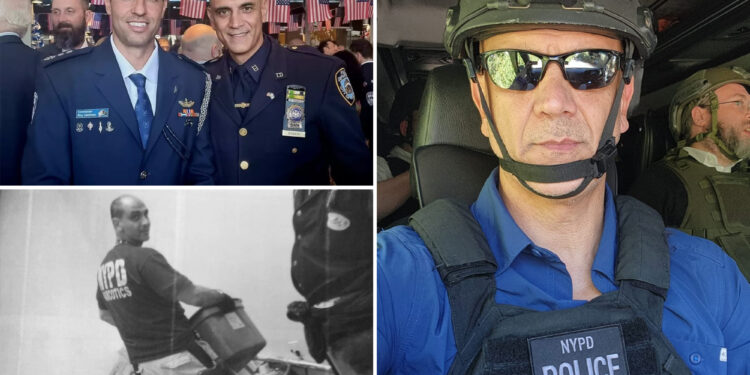
One of New York’s Finest is helping safeguard the homefront – from the holy land.
Charlie Benaim, a veteran NYPD detective and foreign liaison stationed in Israel for the past two decades, told The Post that millions of Israelis are “on edge” in the wake of this week’s Iran’s massive retaliatory missile attack in response to a series of devastating blows to Hezbollah.
“You feel the tension,” Benaim told The Post from Tel Aviv, with millions wondering, “Where’s the nearest shelter and safe room?”
Benaim, who reported back to New York as soon as he got the all-clear to leave his safe room during Tuesday’s assault, said his building was shaking. “It sounded like the interceptions were over my residence,” he recalled, adding stoically, “This is the way of life here. Not an easy situation, not an easy time.”
As one of 14 NYPD liaisons stationed around the world, Benaim, assigned to NYPD’s Intelligence Bureau, works closely with Israeli law enforcement agencies, including Israel National Police, focusing primarily on criminal work and, in the wake of Oct. 7, “much more” counterterrorism.
The 56-year-old dad of two described this tumultuous year in which the Jewish state found itself fighting a multifront war – against Iran’s terror proxies, Hamas in Gaza and Hezbollah in Lebanon – as “more intense” than any other.
“This is a different ballgame than all other operations and attacks that have occurred here since the creation of the state of Israel.”
He might be living the land of milk and honey, but this cop is always in a New York state of mind.
“Whenever there’s a terror attack in Israel, I respond to the scene,” said Banaim. He sends his assessment back to the NYPD.
The priority is to “identify these trends and stop them before they have the potential to come to our city,” he said.
When there’s a situation in the Jewish state, he analyzes and filters it with one mission in mind: “How can this potentially affect New York City?”
The Jerusalem native, who moved to the US to attend John Jay College of Criminal Justice, joined the NYPD in 1997. He served in the elite Organized Crime Control Bureau, narcotics and intelligence before being assigned to Israel in 2007.
While the rhythms of life contrast for the two allied countries nearly 6,000 miles apart, the connection between both is more important than ever.
“I think we’re fighting the same enemy – and the enemy is terrorism,” said Benaim. “And it’s up to us to share information and ensure the safety of our communities all over the world.”
Benaim, who has the dubious distinction of being both in NYC on 9/11 and Israel on Oct. 7, noted, “These are two different major terror attacks in two different parts of the world that have changed the order of things,” he said. “And I’ve been part of both of them.”
On Oct. 7 he was awoken at 6:30 am to the sound of relentless rocket alerts. He immediately began working with Israeli police for information on US hostages with dual citizenship.
Every day since has been “constantly reporting and sharing information, attending briefings, meetings, getting intelligence and information that I report back to New York,” he said.
Benaim’s credo: “It takes a network to defeat a network.”
“That’s exactly what we‘re doing here – creating allies, law enforcement communities, sharing intelligence and best practices.”
His role in Israel has a direct impact on life back in NYC. When he reports a terror attack on a synagogue, church, mosque or school, “right away, I see we’re increasing security or patrols in certain locations. I know I have that impact on the residents of NYC,” he said.
The greatest threats these days aren’t the most obvious ones, said the detective.
In addition to their favorite means of chaos – shootings, stabbings and car rammings – “in Israel, we’ve seen other forms of terrorism,” including arson, and poisoned medication, food and water supplies.
Carrying out a terror attack no longer requires a bomb, rifle or handgun, he warned. “You can simply walk into a shop – buy a knife, scissors, screwdriver – and carry out the terror attack.”
The information pipeline goes in both directions.
When he gets reports from New York that impact officer safety, such as credit cards that are actually knives or pens that can shoot a small-caliber bullet, Benaim shares the information with the Israel National Police. “I give them the heads up about what’s seen in the streets of New York,” he said.
He doesn’t believe New York, which has faced a number of terror plots and attacks since 9/11, is under any greater threat now.
“I do not see NYC being under greater danger from terrorists at this time,” he said.






